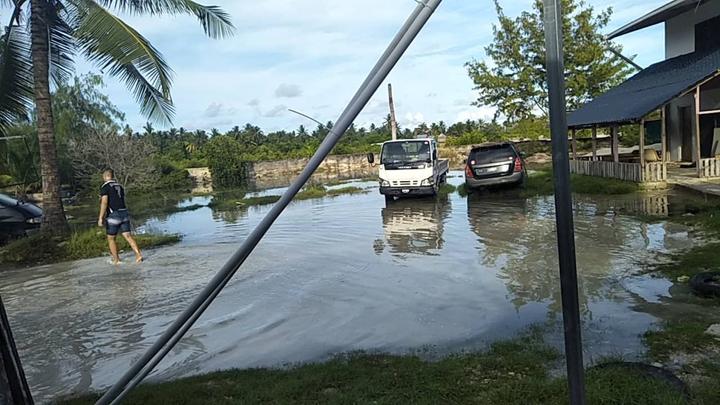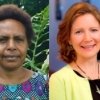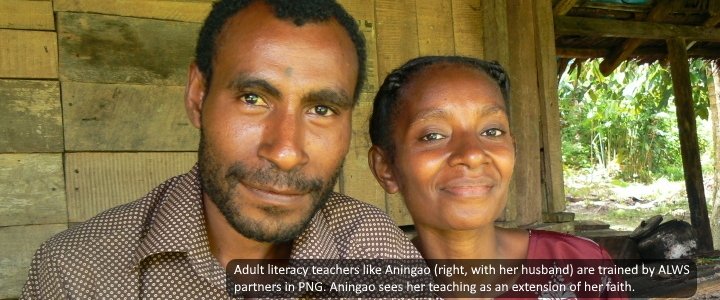The ACFID Code requires members to consistently demonstrate the separation of development and non-development activities in their initiatives (7.3.2). They do this through a policy approach that explicitly refers to religious adherence promotion and political activity. In this blog, CEO Jamie Davies of Australian Lutheran World Service unpacks how they do this, and we benefit from the unique perspective of their implementing partner in PNG.
Serving those most in need, regardless of their religious affiliation or faith tradition, compels and drives me, both as a professional aid and development worker and as a Christian leader. Christians are called to love and serve others, and to do so unconditionally, no matter what those they serve may believe.
In fact, serving others in their community is at the very core of what churches are about. Many churches run highly effective, transformational community development programs on the ground. It is often because of their deep contextual understanding and holistic approaches that they achieve lasting change and more sustainable outcomes.
What I find frustrating is how perceptions of the standard around ‘separation’ overlook the complexity of our journey as aid and development actors. After all, 84% of the world’s population identifies with a religious group.
How does ALWS approach the standard of separation?
A fundamental step in complying with this part of the Code (7.3.2) is ALWS’ explicit policy expressing our commitment to clear separation of aid and development and non-aid and development activities.
Our MoUs and funding agreements with implementing partners overseas state clearly that funding cannot be used for purposes of evangelising, supporting partisan political objectives, or engaging in welfare activities. We take the time to discuss this up front and throughout the program cycle, from design through to monitoring and evaluation, and at all levels of the partnership – from governance to the community.
In our communications, we let our supporters know how they can live their faith through serving others in practical ways, while also being clear that our role does not include evangelising. In particular, every fundraising communication includes a statement that donations will only be used for aid and development activities. For most supporters, this aligns with their belief to love and serve unconditionally, and allows them to express their faith while maintaining the separation between development and non-development activities.
How does this work in practice? A local perspective
Mary Tankulu leads the way for ALWS’ partner, the Evangelical Lutheran Church in Papua New Guinea (ELCPNG), in the Church Partnership Program (CPP), which is supported by the Australian Government through the PNGAusPartnership..
Working in Lae, PNG, Mary is best-placed to address the issue of separation in practice.
“We explain to the leaders of the different church departments what the funding can be used for and what it can’t. We assess the proposed projects and activity plans they develop to ensure they are for community development aims and not for bible studies or mission outreach work. Whether the project activities are around disability inclusion or women’s empowerment or literacy training, we ensure that those carrying them out understand this requirement that everyone can benefit, and that the support is not to be used for religious purposes.”
“A great example of this is the School Counsellor Program. For many years, schools in Lae have been wracked with student violence.
“The ELCPNG’s Education Department organised counselling skills training for teachers and chaplains in church and public schools. Teachers have taken on board new approaches, from anticipating in advance when fights might break out, to enabling frustrated and angry kids to discover new ways of approaching conflict.
“A recent review showed that the counselling program has contributed to reduced tension and outbreaks of violence in schools in Lae since its peak in 2016, and many teachers are now trained in basic counselling.
This example illustrates how training delivered through a church education department to teachers in both public and private schools is focused on community development, with separation maintained.
Mary also adds that having the ELCPNG Church leaders contribute to the governance and design of the program , and leaving the program management and delivery to others was another way that ‘separation’ is achieved seamlessly.
Summing it up
The Evangelical Lutheran Church in PNG has at the heart of its development vision the concept of ‘Gutpela Sindaun,’ which translates as ‘abundant life’, and involves Papua New Guineans living harmoniously with one another and the land. This beautiful concept does not sit separately or in isolation to their faith.
ALWS and ELCPNG do, however, clearly separate the support provided for aid and development programs from the religious and mission work of the church.
What’s not to love?

Tarawa street scene with a king tide on Friday, 30 August 2019. Image: Pelenise Alofa/KiriCAN
Gender is not irrelevant to disaster risk reduction and climate change. Impacts differ across populations. Disasters and other emergencies have specific and substantial impacts on women and people of diverse sexual orientation, gender identity and expression. These impacts are also exacerbated by climate change. Emergencies substantially increase the risk of sexual and gender-based violence, including domestic violence, sexual harassment, early marriage and trafficking. Sexual and reproductive healthcare during emergencies, including provision of safe and dignified menstrual hygiene management, is lifesaving. Addressing the needs of women and people of diverse sexual orientation, gender identity and expression during emergencies can be achieved by adopting an intersectional approach to disaster preparedness, risk reduction, response and recovery.
Coherent and coordinated gender responsive national policies and programs are essential to support gender equality and sustainable development. This is backed up by research into gender-responsive climate responses which found that integrated approaches to climate change that drive transformative change in gender relations must value women’s localized and traditional knowledge; support women’s participation in decision making; resource women’s collective action; and address unequal gender norms.
CSW will be highlighting best practices, sharing knowledge, highlighting the critical role of women and girls at the heart of climate resilience, food security and mitigation and adaptation. Gender inequality leads to disproportionate impacts on women and girls. Policies and programs need to address the structural inequalities and power imbalances for women and other marginalized groups to adapt to climate change.
Greater attention must be given to specific needs of women and girls and access to resources and meaningful participation in decision making. Gender must be integrated into the design and implementation of measures. Women and girls’ inequalities and discrimination faced in the impacts of environmental damage and climate change impacts must be reflected in policy debates and practical actions. Gender equality and tackling inequalities must be placed at the heart of climate solutions.
Join us in October for the ACFID Conference where we delve into the intersections between equity, inclusion and climate change.

Mary Tankulu & Jamie Davies
Left: Mary Tankulu is the Coordinator of the DFAT-funded PNG Church Partnership Program on behalf of ALWS and Evangelical Lutheran Church of Papua New Guinea.
Right: Jamie Davies is the Executive Director of Australian Lutheran World Service, the aid and development agency of the Lutheran Church of Australia and New Zealand. Jamie has over 20 years of international relief and development experience in Africa, Central America and Southeast Asia, with a focus on strengthening faith-based organizations and partnerships.









